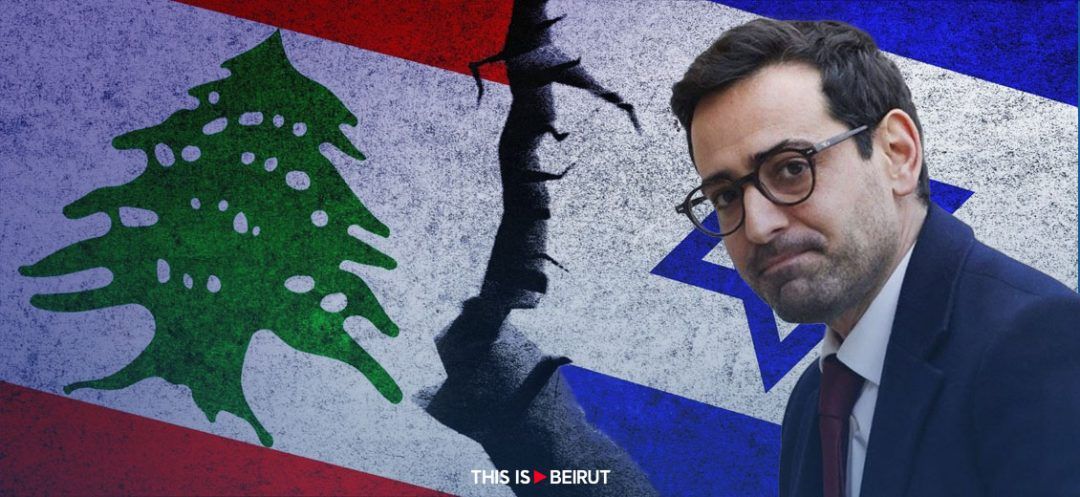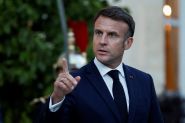- Home
- War in the Middle East
- French Initiative: Revisited and Non-Provocative

The French initiative for settling the conflict in South Lebanon underwent slight modifications that preserved its core content while refining the language related to the three stages of the proposed solution. These changes were crafted to maintain a non-provocative tone, fostering acceptance and facilitating negotiations among all concerned parties.
French Foreign Minister Stéphane Séjourné’s second visit to Lebanon last week marked a potential turning point, possibly reopening channels for a peaceful diplomatic solution. This move aims to spare Lebanon from a full-blown war and further escalation of violence on the southern front, by implementing UN Resolution 1701. Séjourné’s meetings with Lebanese officials served as a tangible reaffirmation of France's unwavering support of Lebanon, echoing President Emmanuel Macron's commitment relayed to caretaker Prime Minister Najib Mikati and Army Commander General Joseph Aoun at the Élysée Palace.
The verbal and tacit conveyance of the French proposal by the minister, aimed at potentially brokering a ceasefire between Hezbollah and Israel – separate from the ongoing conflict in Gaza –, was then formally delivered in writing to Speaker of Parliament Nabih Berri. This move came after the French Foreign Minister took into consideration various Lebanese observations. Furthermore, French Ambassador to Lebanon Hervé Magro conveyed the outcomes of Séjourné’s visit and France's new proposals regarding a de-escalation in southern Lebanon. In parallel, Séjourné will convey the same during his visit to Tel Aviv.
According to high-ranking French diplomatic sources speaking to This is Beirut, the French proposal document underwent minor changes after Séjourné consulted with Lebanese officials. These revisions didn't alter the substance, but focused on refining expressions related to the three stages of the solution, ensuring that they are non-provocative to any party. In turn, this would expedite approval and facilitate negotiations.
The first stage entails halting hostilities and military actions by both belligerents, Hezbollah and Israel, as well as ending Israeli violations in a manner conducive to implementing Resolution 1701.
In the clause about the withdrawal of armed groups to a distance of 10 kilometers north of the Litani River, the terminology has been altered to "redeployment" of Hezbollah fighters, without specifying the required distance for withdrawal from border areas. Sources note that this change in terminology marks a significant and unprecedented development compared to previous initiatives.
Furthermore, sources underlined the importance of coordination between the Lebanese Army and UNIFIL forces, and the crucial role of the UN peacekeepers, in partnership with the Lebanese state, to maintain security and stability, which is of utmost concern to the French. With around 700 French soldiers among UNIFIL's forces in southern Lebanon, it's essential to clarify their roles and prerogatives along the southern border and in collaboration with the Lebanese army.
Under the second phase, the displaced on both sides of the border would return to their homes in southern Lebanon and northern Israel, furthering stability.
The third phase, which is the lengthiest, entails the establishment of a committee grouping representatives from the Lebanese and Israeli armies, international forces, as well as representatives from the US and French armies. This marks a different approach from the previous tripartite committee held in Naqoura. The mission of the new committee centers on negotiating a resolution to the border conflict. It includes the 13 disputed border points, the village of Ghajar, for which a UN resolution mandates Israel's withdrawal, the Shebaa Farms and Kfarchouba hills.
Sources indicate that there is a somewhat growing flexibility among all parties involved to explore potential solutions. However, the main priority remains achieving a ceasefire in Gaza to capitalize on this momentum. They note that the French Foreign Minister, currently visiting Saudi Arabia, may present a request to Saudi officials regarding dialogue and negotiations with the Iranian side. This initiative aims to facilitate diplomatic efforts, particularly in light of the recent developments following the Saudi-Iranian agreement reached in China.
Seemingly, Séjourné is expected to meet his American counterpart, Antony Blinken, in Saudi Arabia to discuss the latest developments regarding the French initiative. What will Lebanon's response be to this modified French proposal? And will it facilitate the path towards implementing Resolution 1701 which, according to diplomatic sources, remains the sole guarantor of stability in southern Lebanon?
Read more



Comments